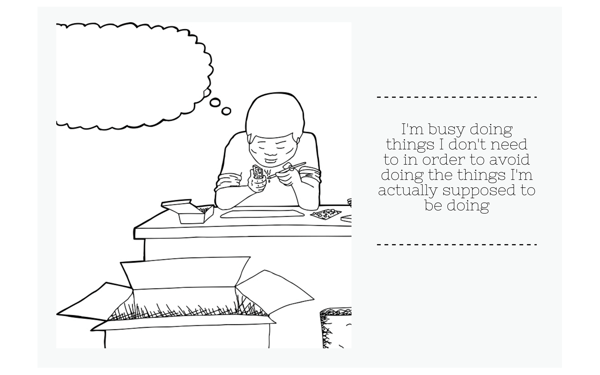So, what tasks do you find draining? We all have those certain tasks we put off or avoid altogether.
Wouldn't life be awesome if we could just focus on the tasks and activities that excite and motivate us? In point of fact, we all have responsibilities that feel easier and more comfortable, but we also have ones we tend to put off or avoid. Consider those tasks you find boring, too hard, or even anxiety causing. Our job-related tasks are things we need to get done in order to be productive and do our jobs well. How can DISC help us to be more productive?
DISC helps us understand our task preferences
 How easy or difficult is it for you to make that call to a reluctant prospect or turn in a completed, proofread proposal? Do you find yourself delaying the talk you need to have with a difficult employee? Have you avoided turning in your final report because you haven't finished it yet?
How easy or difficult is it for you to make that call to a reluctant prospect or turn in a completed, proofread proposal? Do you find yourself delaying the talk you need to have with a difficult employee? Have you avoided turning in your final report because you haven't finished it yet?
Some tasks can be easier for some, yet harder for others. Delaying or avoiding tasks wastes our time and ends up decreasing our productivity and reaching our goals. Yes, there are many effective techniques to start tasks we've been avoiding, but the DISC tool helps us find the most effective techniques to use. Some techniques such as 'finding a motivation buddy' or 'dropping the perfectionism' may work better for some of us, yet have the opposite effect on others.
DISC helps you to better understand the tasks which are more comfortable and motivating, and those which are not. Once we are more confidently self aware of our preferences, we can prepare and practice more effective approaches to tackling our everyday tasks.
D-style's tasks preferences
 D-styles often prefer tasks they feel are more challenging and there's a chance to accomplish clear, quantifiable goals. A certain amount of risk or the sense of winning can create the energy they need to accomplish the task. They may feel more motivated if they are provided a sense of independence. Tasks that are comprehensive and multi-dimensional tend to be right up the D-style's alley.
D-styles often prefer tasks they feel are more challenging and there's a chance to accomplish clear, quantifiable goals. A certain amount of risk or the sense of winning can create the energy they need to accomplish the task. They may feel more motivated if they are provided a sense of independence. Tasks that are comprehensive and multi-dimensional tend to be right up the D-style's alley.
Routine tasks, without perceived challenges or risks, can be a reason the D-style avoids or delays a task. They find tasks more challenging if they have to listen or take direction from others.The more individualistic D-style wants to work at their own quick pace, without needing to stop and assist others.
I-style's task preferences
 I-styles gravitate to tasks where they can work with people; especially if it provides an opportunity to interact with different types of people. They will look for tasks that are engaging and positive. I-styles don't mind multi-tasking, especially if it means taking on new things all the time. They may find the chaos of juggling tasks exciting, but it doesn't always mean they'll complete them all. I-styles tend to gravitate to tasks that are team-based or where they'll have opportunities to talk with others. Getting started typically isn't the issue for the I-style; rather, it's the staying on track to get it done.
I-styles gravitate to tasks where they can work with people; especially if it provides an opportunity to interact with different types of people. They will look for tasks that are engaging and positive. I-styles don't mind multi-tasking, especially if it means taking on new things all the time. They may find the chaos of juggling tasks exciting, but it doesn't always mean they'll complete them all. I-styles tend to gravitate to tasks that are team-based or where they'll have opportunities to talk with others. Getting started typically isn't the issue for the I-style; rather, it's the staying on track to get it done.
I-styles tend to shy away from unpleasant decisions and conflict situations. They may not want to address a hard issue because it may hurt the other person's feelings or make them mad. Tasks involving hard facts, like writing a proposal that requires a lot of data and documentation, can feel overwhelming.
S-style's Task Preferences
 S-styles prefer clearly defined and predictable tasks they are already familiar with; relating to their own experience. They prefer to focus on tasks they are already proficient in, rather than tackling new ones. They want to be able to work at their own pace and have the opportunity to gather feedback and support from their team members. S-styles may avoid the spotlight, preferring to be in the background. They prefer guidance and clear direction, rather than taking the lead.
S-styles prefer clearly defined and predictable tasks they are already familiar with; relating to their own experience. They prefer to focus on tasks they are already proficient in, rather than tackling new ones. They want to be able to work at their own pace and have the opportunity to gather feedback and support from their team members. S-styles may avoid the spotlight, preferring to be in the background. They prefer guidance and clear direction, rather than taking the lead.
S-styles are less comfortable with tasks that involve perceived risks. Tasks involving transitions and changes can be more daunting. For example, overhauling a project where they don't have clear instructions or don't know what the outcome will be can feel overwhelming. They also want the time to focus on a task, rather than rushing to tackle overlapping projects.
C-style's Task Preferences

C-styles find tasks to be more motivating when they are able to develop their own skill and professionalism. They want tasks to be clearly defined and logical. They also want time to focus on their tasks independently and on their own timeline. C-styles tend to shy away from tasks where they have to make risky decisions without the data to support it. They can be quite motivated to get started on a task if it involves gathering data or focuses on an area of their expertise.
Tasks which require them to be more abstract or more confrontational can feel uncomfortable. For example, C-styles may avoid or procrastinate if they need to return a call to an angry client or have to spend a lot of time chit chatting. Similar to the S-style, they do not like being rushed or feel distracted from juggling many tasks at once.

Remember, we are all DISC Styles; some behaviors simply are more natural and take more energy. The same thing applies to our everyday tasks; some tasks don't take energy and may feel motivating, while other tasks drain our energy and we tend to avoid them. We can excel at all tasks. The Extended DISC Assessment does not predict our ability and success at accomplishing tasks; it only predicts our behavioral preferences for tasks. We can excel at all tasks.
Many task avoidance techniques tell us to just, 'do it,' but awareness of our preferences provides a starting point for knowing which tasks we tend to favor and which ones will take practice and more conscious awareness. While DISC doesn't necessarily solve the problem, it does help us understand the tasks that are easier for us and those we need to take that deep breath and consciously say, 'I've got this!'
